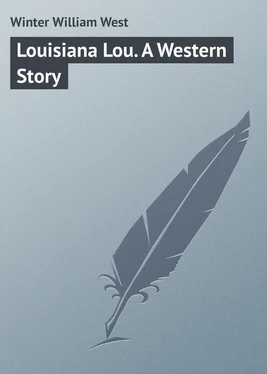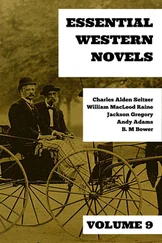William Winter - Louisiana Lou. A Western Story
Здесь есть возможность читать онлайн «William Winter - Louisiana Lou. A Western Story» — ознакомительный отрывок электронной книги совершенно бесплатно, а после прочтения отрывка купить полную версию. В некоторых случаях можно слушать аудио, скачать через торрент в формате fb2 и присутствует краткое содержание. Жанр: foreign_adventure, foreign_prose, foreign_language, на английском языке. Описание произведения, (предисловие) а так же отзывы посетителей доступны на портале библиотеки ЛибКат.
- Название:Louisiana Lou. A Western Story
- Автор:
- Жанр:
- Год:неизвестен
- ISBN:нет данных
- Рейтинг книги:5 / 5. Голосов: 1
-
Избранное:Добавить в избранное
- Отзывы:
-
Ваша оценка:
- 100
- 1
- 2
- 3
- 4
- 5
Louisiana Lou. A Western Story: краткое содержание, описание и аннотация
Предлагаем к чтению аннотацию, описание, краткое содержание или предисловие (зависит от того, что написал сам автор книги «Louisiana Lou. A Western Story»). Если вы не нашли необходимую информацию о книге — напишите в комментариях, мы постараемся отыскать её.
Louisiana Lou. A Western Story — читать онлайн ознакомительный отрывок
Ниже представлен текст книги, разбитый по страницам. Система сохранения места последней прочитанной страницы, позволяет с удобством читать онлайн бесплатно книгу «Louisiana Lou. A Western Story», без необходимости каждый раз заново искать на чём Вы остановились. Поставьте закладку, и сможете в любой момент перейти на страницу, на которой закончили чтение.
Интервал:
Закладка:
This was what Doolittle, with a kindly impulse of sympathy, was endeavoring tactfully to convey to the military gentleman. But he found him unresponsive.
“There’s one thing you overlook, Doolittle,” De Launay retorted to his well-meant suggestions. The banker, more used to French than English, felt vaguely startled to find him talking in accents as unmistakably American as had been his own many years ago, though there was something unfamiliar about it, too – a drawl that was Southern and yet different. “Money’s no use to me, none whatever! I might have enjoyed it – or enjoyed the getting of it – if I could have made it myself – taken it away from some one else. But to have it left to me like this after getting along without it for twenty years and more; to get it through a streak of tinhorn luck; to turn over night from a land-poor Louisiana nester to a reeking oil millionaire – well, it leaves me plumb cold. Anyway, I don’t need it. What’ll I do with it? I can’t hope to spend it all on liquor – that’s about all that’s left for me to spend it on.”
“But, my dear general!” Doolittle found his native tongue rusty in his mouth, although the twenty-year expatriate, who had originally been of French descent, had used it with the ease of one who had never dropped it. “My dear general! Even as a lieutenant colonel, the social advantages open to a man of such wealth are boundless – absolutely boundless, sir! And if you are ambitious, think where a man as young as you, endowed with these millions, can rise in the army! You have ability; you have shown that in abundance, and, with ability coupled to wealth, a marshal’s baton is none too much to hope for.”
De Launay chuckled mirthlessly. “Tell it to the ministry of war!” he sneered. “I’ll say that much for them: in France, to-day, money doesn’t buy commands. Besides, I wouldn’t give a lead two-bit piece for all the rank I could come by that way. I fought for my gold braid – and if they’ve taken it away from me, I’ll not buy it back.”
“There will be other opportunities for distinction,” said Mr. Doolittle, rather feebly.
“For diplomats and such cattle. Not for soldiers. There was a time when I had ambition – there are those who say I had too much – but I’ve seen the light. War, to-day, isn’t what it used to be. It’s too big for any Napoleon. It’s too big for any individual. It’s too big for any ambition. It’s too damn big to be worth while – for a man like me.”
Mr. Doolittle was puzzled and said so.
“Well, I’ll try to make it clear to you. When I started soldiering, it was with the idea that I’d make it a life work. I had my dreams, even when I was a degraded outcast in the Legion. I pursued ’em. They were high dreams, too. They are right in suspecting me of that.
“For a good many years it looked as though they might be dreams that I could realize. I’m a good soldier, if I do say it myself. I was coming along nicely, in spite of the handicap of having come from the dregs of Sidi-bel-Abbes up among the gold stripes. And I came along faster when the war gave me an opportunity to show what I could do. But, unfortunately for me, it also presented to me certain things neither I nor any other man could do.
“You can’t wield armies like a personal weapon when the armies are nations and counted in millions. You can’t build empires out of the levy en masse. You can’t, above all, seize the imagination of armies and nations by victories, sway the opinions of a race, rise to Napoleonic heights, unless you can get advertising – and nowadays a kid aviator who downs his fifth enemy plane gets columns of it while nobody knows who commands an army corps outside the general staff – and nobody cares!
“Where do you get off under those circumstances? I’ll tell you. You get a decoration or two, temporary rank, mention in the Gazette – and regretful demotion to your previous rank when the war is over.
“War, Mr. Doolittle, isn’t half the hell that peace is – to a fellow like me. Peace means the chance to eat my heart out in idleness; to grow fat and gray and stupid; to – oh! what’s the use! It means I’m through – through at forty, when I ought to be rounding into the dash for the final heights of success.
“That’s what’s the trouble with me. I’m through, Mr. Doolittle; and I know it. That’s why I look like this. That’s why money means nothing to me. I don’t need it. Once I was a cow-puncher, and then I became a soldier and finally a general. Those are the things I know, and the things I am fit for, and money is not necessary to any of them.
“So I’m through as a soldier, and I have nothing to turn back to – except punching cows. It’s a comedown, Mr. Doolittle, that you’d find it hard to realize. But I realize it, you bet – and that’s why I prefer to feel sort of low-down, and reckless and don’t-give-a-damnish – like any other cow hand that’s approaching middle age with no future in front of him. That’s why I’m taking to drink after twenty years of French temperance. The Yankees say a man may be down but he’s never out. They’re wrong. I’m down – and I’m out! Out of humor, out of employment, out of ambition, out of everything.”
“That, if you will pardon me, general, is ridiculous in your case,” remonstrated the banker. “What if you have decided to leave the army – which is your intention, I take it? There is much that a man of wealth may accomplish; much that you may interest yourself in.”
De Launay shook a weary head.
“You don’t get me,” he asserted. “I’m burned out. I’ve given the best of me to this business – and I’ve realized that I gave it for nothing. I’ve spent myself – put my very soul into it – lived for it – and now I find that I couldn’t ever have accomplished my ambition, even if I’d been generalissimo itself, because such ambitions aren’t realized to-day. I was born fifty years too late.”
Mr. Doolittle clung to his theme. “Still, you owe something to society,” he said. “You might marry.”
De Launay laughed loudly. “Owe!” he cried. “Such men as I am don’t owe anything to any one. We’re buccaneers; plunderers. We levy on society; we don’t owe it anything.
“As for marrying!” he laughed again. “I’d look pretty tying myself to a petticoat! Any woman would have a fit if she could look into my nature. And I hate women, anyway. I’ve not looked sideways at one for twenty years. Too much water has run under the bridge for that, old-timer. If I was a youngster, back again under the Esmeraldas – ”
He smiled reminiscently, and his rather hard features softened.
“There was one then that I threatened to marry,” he chuckled. “If they made ’em like her – ”
“Why don’t you go back and find her?”
De Launay stared at him. “After twenty years? Lord, man! D’you think she’d wait and remember me that long? Especially as she was about six years old when I left there! She’s grown up and married now, I reckon, and she’d sick the dogs on me if I came back with any such intentions.”
He chuckled again, but his mirth was curiously soft and gentle. Doolittle had little trouble in guessing that this memory was a tender one.
But De Launay rose, picked up a bundle of notes that lay on the table in front of him, stuffed them carelessly into the side pocket of his tunic and pushed the képi still more recklessly back and sideways.
“No, old son!” he grinned. “I’m not the housebroke kind. The only reason I’d ever marry would be to win a bet or something like that. Make it a sporting proposition and I might consider it. Meantime, I’ll stick to drink and gambling for the remaining days of my existence.”
Читать дальшеИнтервал:
Закладка:
Похожие книги на «Louisiana Lou. A Western Story»
Представляем Вашему вниманию похожие книги на «Louisiana Lou. A Western Story» списком для выбора. Мы отобрали схожую по названию и смыслу литературу в надежде предоставить читателям больше вариантов отыскать новые, интересные, ещё непрочитанные произведения.
Обсуждение, отзывы о книге «Louisiana Lou. A Western Story» и просто собственные мнения читателей. Оставьте ваши комментарии, напишите, что Вы думаете о произведении, его смысле или главных героях. Укажите что конкретно понравилось, а что нет, и почему Вы так считаете.




![Wilhelm Winter - Война по убеждениям [СИ]](/books/395832/wilhelm-winter-vojna-po-ubezhdeniyam-si-thumb.webp)







